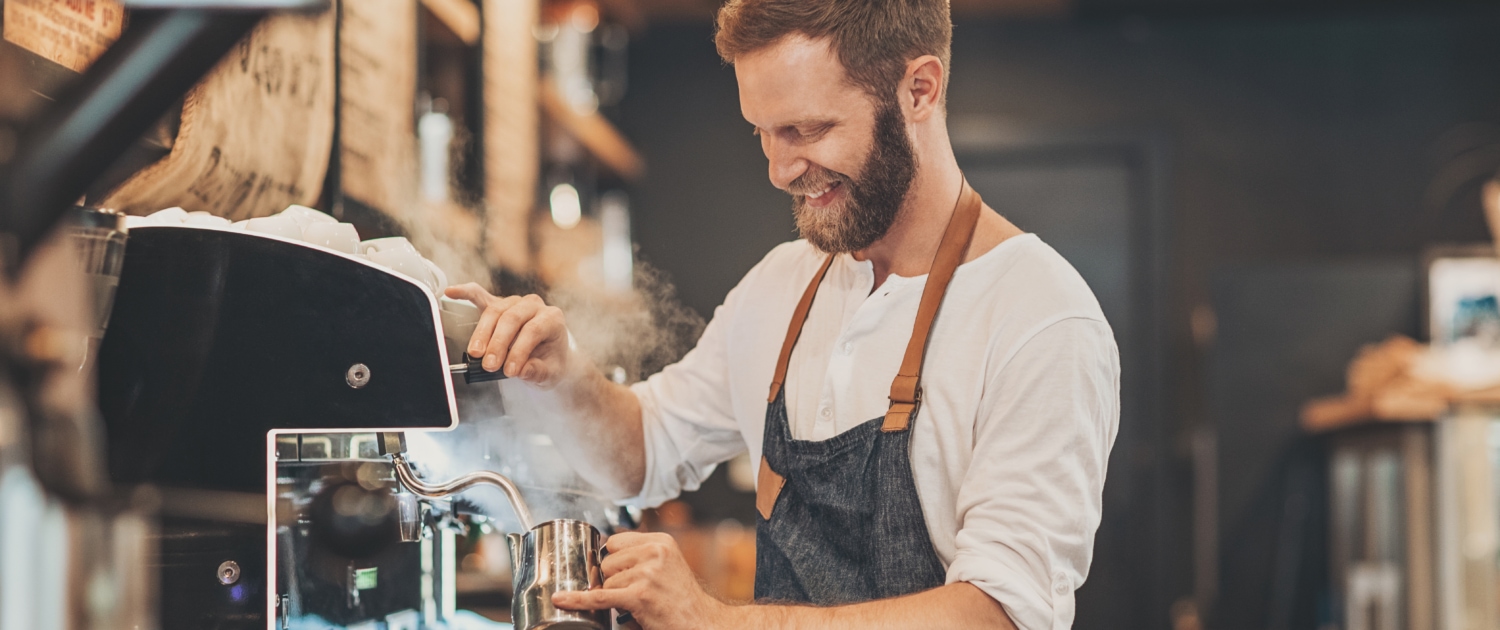What is a Barista?
– How to Professionally Make Coffee –
Coffee is one of the most popular beverages in the world.
It not only tastes delicious in all of its creative varieties. But, the dark liquid also comes with a lot of great health benefits. Some people even say that it makes them happier and live longer.
Overall, we can all look back on a very diverse and interesting history of coffee. And, it seems that our coffee universe is even constantly expanding.
Nowadays, you can basically find either a franchise or local coffee shop around almost every corner.
Skilled coffee makers will welcome you and prepare delicious coffee drinks. Becoming a barista has become a real craft many coffee enthusiasts are eager to learn.
Clearly, baristas and their passion further drive our coffee culture forward.
‘Barista’ is more than a word.
It is a true profession. These days, working in a coffee shop can be a career filled with opportunities for individual and professional progression, meaningful goals and job satisfaction for many.
But what are the key elements and most important parts of working as a barista?
What kind of skill set should you ideally acquire? And, are baristas and their profession still underrated to this day?
Here is everything you need to know about the barista.
Barista and its Origins
The word, ‘barista’, actually originates from Italy.
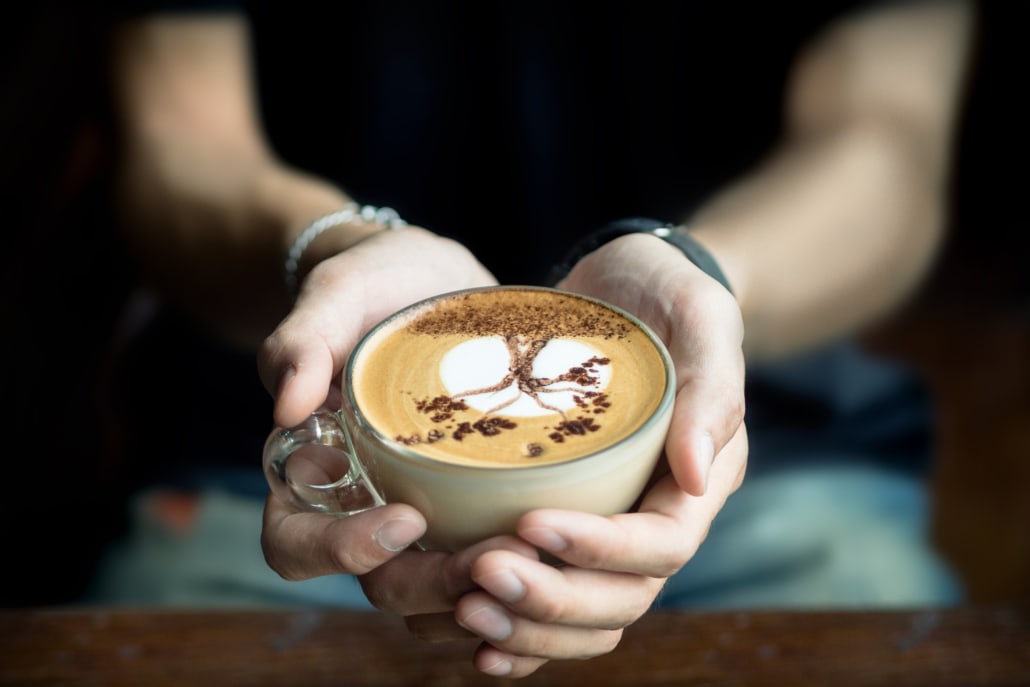
Here, it literally means ‘bartender’. Hence, a person who serves alcoholic and also non-alcoholic drinks espresso and coffee drinks.
In Italian language and when using the singular version of ‘barista’, the term is gender neutral. You can use it both for men and women.
The same applies in English. Besides being gender neutral when singular. It is also the same when using plural, namely ‘baristas’.
However, in Italian, there is a difference between singular and plural. In fact, it becomes gender-specific when plural.
For men, it would be the masculine ‘baristi’, which means ‘barmen’. And, the feminine version would be ‘bariste’. This means ‘barmaids’.
Furthermore, most people limit and associate the term, ‘barista’, outside of Italy, nowadays.
It is someone, who only serves coffee-based beverages. Commonly, it is not including the service of preparing and serving alcoholic beverages as well.
Technically, the term, ‘barista’, refers to someone who has been professionally trained preparing espressos.
However, many people also just use it to describe anyone having high coffee skill levels. Especially, when it’s comes to making espresso shots and espresso drinks. These include drinks such as lattes and cappuccinos.
A Barista’s Job Description
In general, baristas are commonly working in coffeehouses, coffee shops or coffee bars.
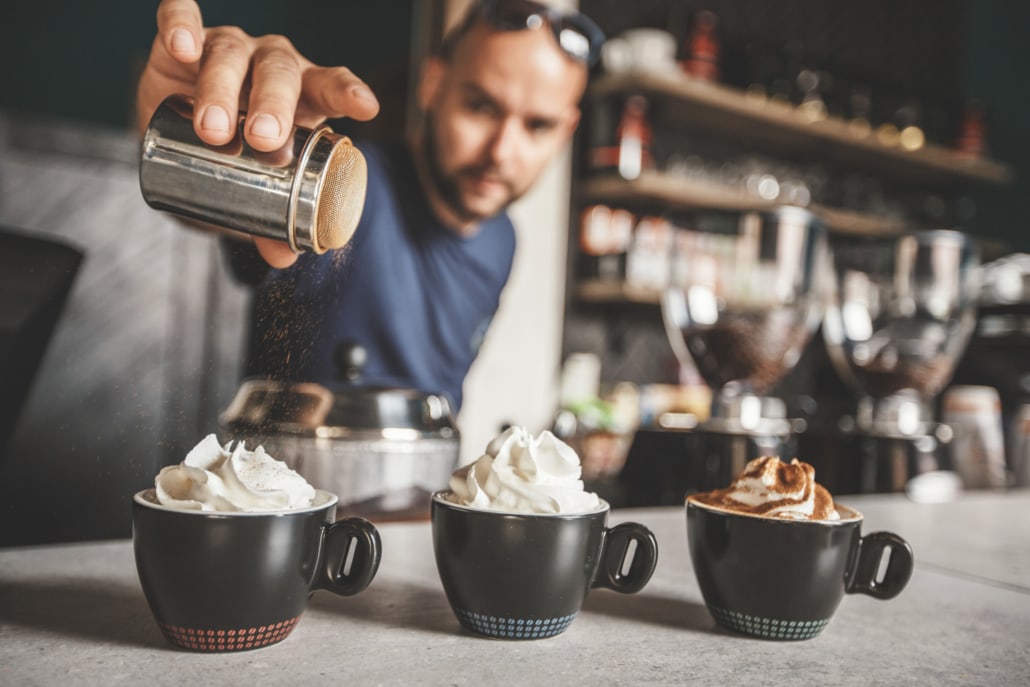
Typically, they will operate highly functional, commercial espresso machines, rather than common home espresso machines.
At first sight, their job and its responsibilities may sound simple. But, properly and professionally handling commercial espresso machines certainly requires a certain skill level.
Overall, even commercial espresso machines are ranging in difficulty.
Some of these machines are manual, hence they require immense skill and training. And, you will need the ability to adapt to the nuance of each batch of coffee.
With these manual machines, there may even be more factors you might have to take into account. These include the day’s weather conditions, the drinker’s preferences and other details.
On the opposite, other espresso machines are ‘super-automatic’.
Basically, these machines will cover most of your needed skill set in theory. Eventually, it requires no more than simply loading the machine with whole beans and pushing the button.
Normally, baristas are working with the more highly-detailed machines.
So, they need to learn the complicated steps of professionally preparing espresso shots.
Going the Barista Extra Mile
When becoming a professionally recognized barista, properly making espresso is only the beginning.
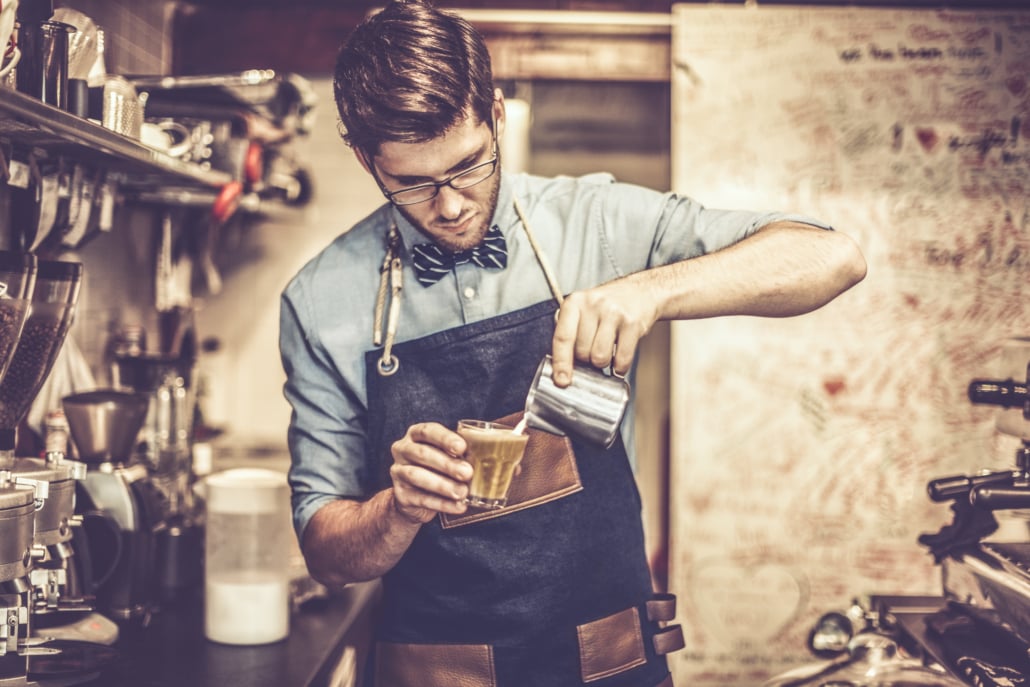
Additionally, baristas are also foaming, frothing and steaming milk. This enables them to make a wide range of espresso-based drinks.
On top, they learn how to masterfully prepare coffee drinks. These would be such as French press coffee, pour over coffee and drip coffee.
Eventually, a barista should feel comfortable with many coffee drink preparations.
Furthermore, it is also a barista’s job to know the characteristic differences between these drinks.
For example, what is a Cortado? And, how does it work? Typically, you are making this drink with equal parts of densely steamed milk to espresso.
How is it different compared to a Flat White? Commonly, coffee makers are preparing these with equal parts of steamed and textured milk and espresso.
It is these details and attention to them, which sets better baristas apart from average.
Finally and actually most importantly, great customer service is essential for any successful barista.
Eventually, you are serving customers with drinks. And, while skilled baristas are preparing them. They are also socially and directly interacting with them the same time.
However, in larger coffeehouses this may be different.
Here, most baristas are rather working behind the scenes. Hence, they will not interact with any customer much.
But, in local and smaller coffee shops, you will most likely have the same person taking your order and then making the drink for you as well.
Many coffee enthusiasts appreciate such smaller, individual and usually cozier environments and interactions with independently working baristas.
Barista Training and Expertise
In theory, it is possible for a barista to acquire his or her job skills by attending training courses, for example.
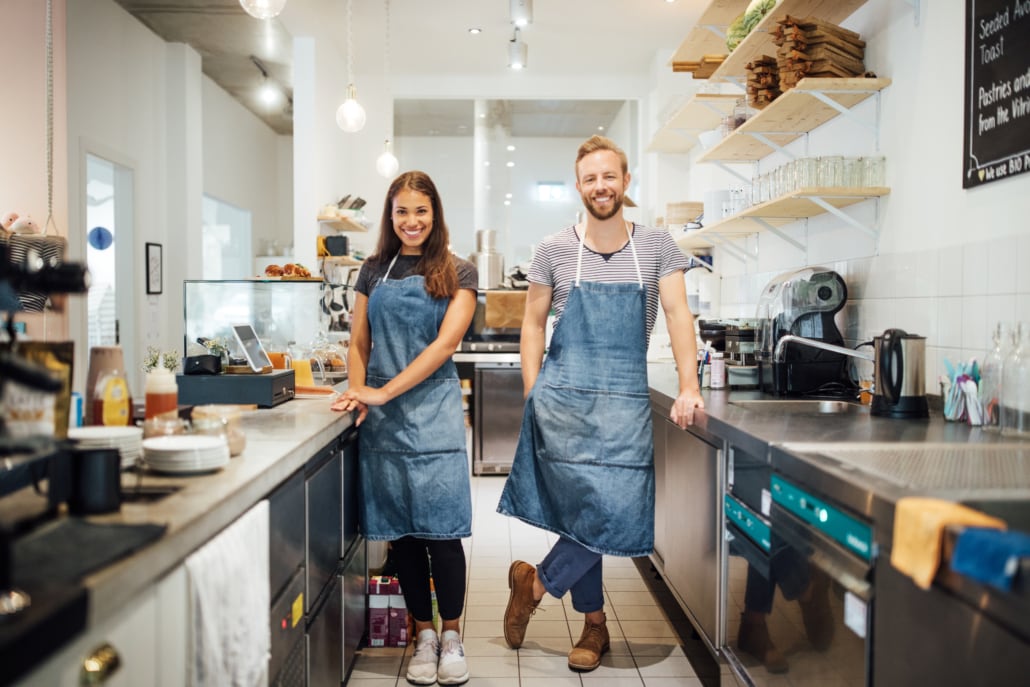
However and in most cases, the actual training and skill set for a barista is usually taught right on the job. Typically, more experienced and longstanding employees are teaching the newer ones.
Once you are able and have mastered general barista skills. It really becomes fun being creative and preparing exciting coffee drinks.
In fact, many baristas learn to appreciate and take great pride in their skills.
Many of them are literally spending years of optimizing specific techniques. This is in order to craft perfect drinks, for the eye and taste.
Over time, these experiences and their acquired knowledge will be passed down by training new employees.
Usually, the training starts by mastering everyday drinks.
All the way to creating specialized drinks, that will need knowledge how to use complicated techniques and machinery.
How can I Become a Barista?
Generally, there are no educational requirements to become a barista.
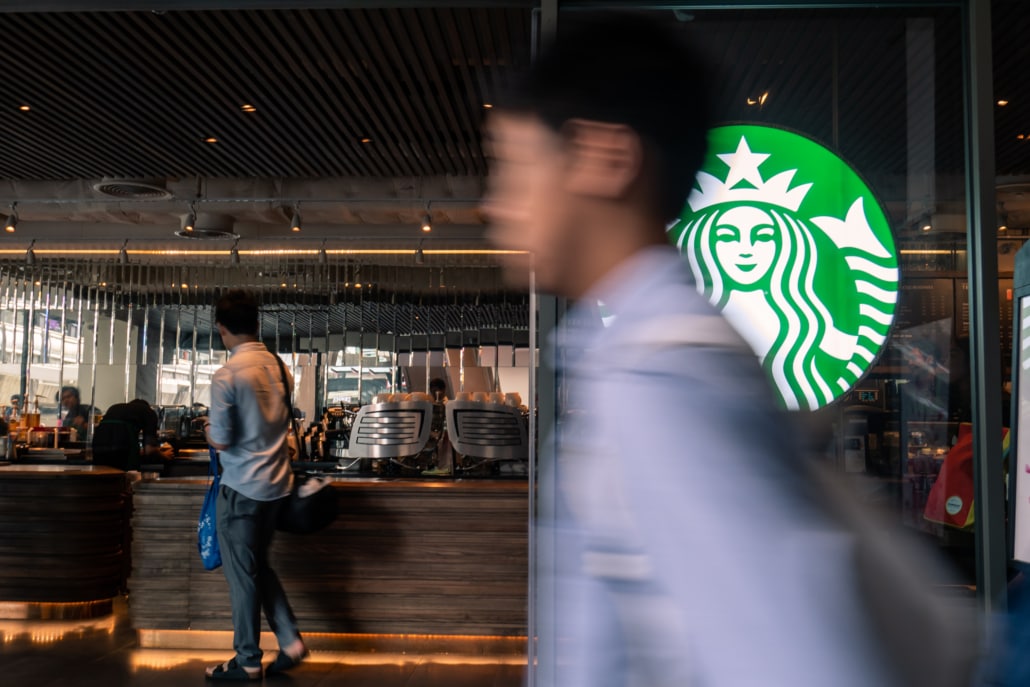
However, most accomplished baristas at least have a high school diploma or something equivalent.
Typically, coffee shops or larger franchises will require you to be 18 years old. Usually, older employees or more experienced ones are conducting the trainings then.
Such trainings include roasting beans and brewing techniques. On top, other important lessons focus on steaming milk, machine sanitation and customer service.
Moreover, more prominent and corporate-like companies such as Starbucks or Coffee Bean may offer more extensive trainings on the job. This is compared to smaller and local coffee shops.
But, there are also many smaller shops with great focus on all-around barista skills.
At the end of the day, you will just have to see what is best for you. What would you like to achieve? And, in which kind of environment could you imagine to work?
Overall, one point is very crucial.
Consistency in the quality of your beverages is essential. You want your customers to come back again and again.
If you are interested to learn more about barista skills and techniques. Nowadays, there are quite many barista programs available.
These allow you to learn everything about becoming a barista. They are pretty easy to find online these days.
A popular one is the International Barista and Coffee Academy. In addition, there is the Seattle Barista Academy, Texas Coffee School and many more.
These examples are all from the US. But, there is surely one in every country.
Commonly, such programs cover all essential barista skills. The list goes from coffee roasting, brewing, equipment maintenance, coffee art and business operation courses.
Go ahead and have a look, if you like.
More Than Simply Making Coffee
Besides common barista skills, many employees are also looking for individual qualities as well.

These may include rather soft skills such as good listening, verbal communication, attendance, and organization.
Even though, this may not be initially required. Great customer service and team work skills are surely a plus, too.
On a daily basis, a barista is working closely with customers and colleagues. Hence, you ideally need to have the ability to build harmonious relationships.
For this, an outgoing personality and presence in a professional manner is definitely helping.
In addition, other useful skills are being to prioritize, problem-solve, and multi-task in a usually fast-paced work environment.
Quite regularly, you might receive mixed up coffee orders. Or, you are encountering machine problems.
And, once in a while, you certainly will also have to deal with unhappy customers.
To sum up, a barista needs to get used to efficiently working under pressure. Therefore, especially multi-tasking is quite essential.
Typically, you are taking an order here. And, you are preparing hot and cold beverages there. Plus, you are decorating drinks and will serve your customers.
On top, some coffee shops even serve food as well.
If you are thinking of even taking the next step and consider advancing to management. This usually requires some additional schooling.
Some baristas are attending colleges. Or, they may take classes to gain more knowledge and credentials on how to run a business, for example.
At some point, it can even allow you to open your own coffee shop. Or, some advanced roles within the coffee industry.
Quite often, potential higher roles ask for either culinary programs, business degrees, or coffee education programs. I already mentioned some programs above.
Any of these will open any doors easier for you.
Are Baristas Underrated Professionals?
When considering all of these different skill-sets and challenges coming with it.
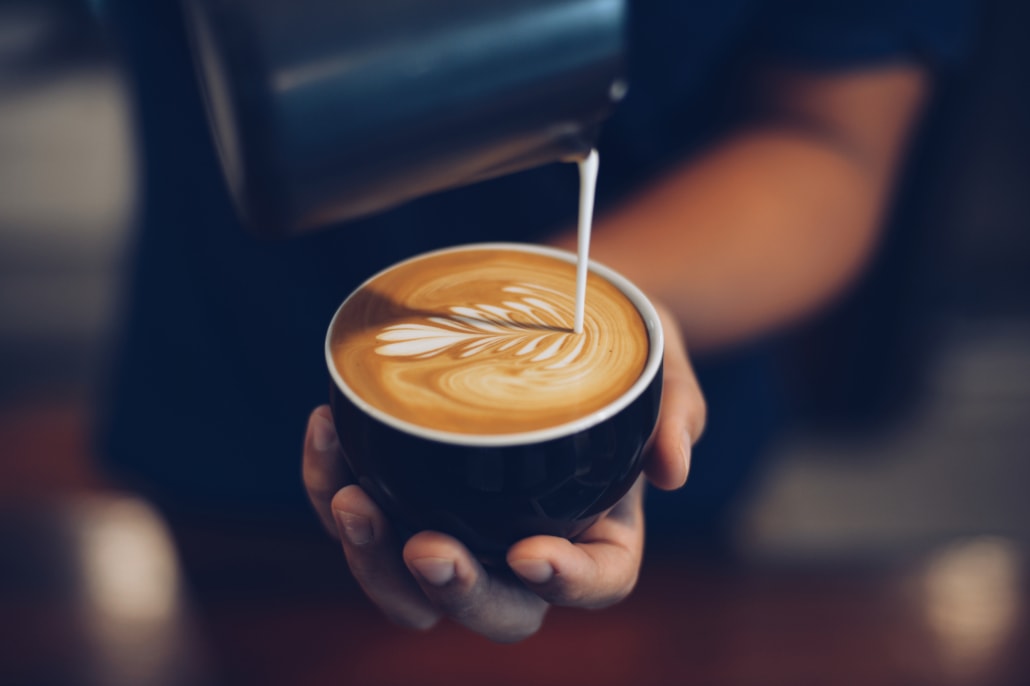
Many people argue that specialty baristas are actually underrated coffee professionals. Therefore, many baristas often struggle for respect.
However, there are also other people merely saying the opposite.
They see the barista as an overly glorified coffee-maker. And, in their eyes, baristas eventually deserve less attention in comparison to the producer and roaster.
Overall, one could maybe say that the barista is responsible for presenting the final product to the consumer.
Furthermore, this average customer is most likely to make a judgement at the end of the day. This opinion and feedback will also include the quality of coffee roasting and production as well.
How well does their drink taste? And, how well did the barista make and serve it?
Professional and skilled baristas are surely a great tool to better promote the colorful universe of specialty coffee.
Eventually, it’s all about team work. The barista, producer, roaster and farmer all need to work hand in hand.
High consistency of ensuring great quality is eventually key to a well-balanced product and satisfying customer service.
In many situations, the barista will become the public face of this entire coffee industry network. So, yes, their role is important and should be appreciated as such, I would say.
Become a Barista Champion
Is there an ideal barista?
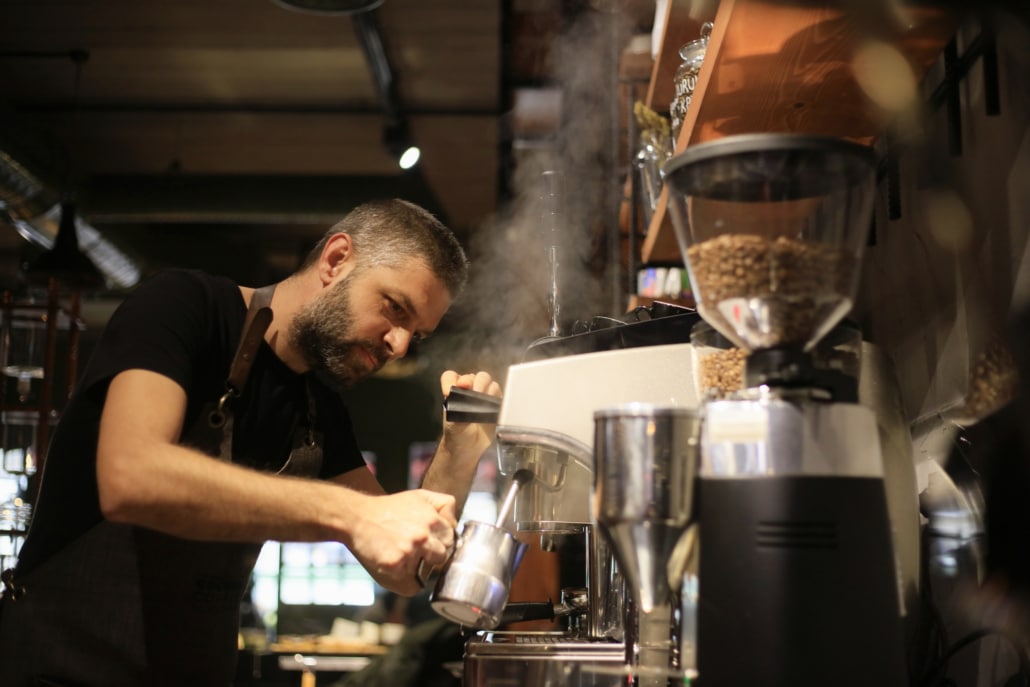
Maybe there are many different and individually great versions of becoming a respectable barista in your own community.
But that doesn’t mean that accomplished baristas are not trying to improve and compete against each other.
In fact, it is this barista’s obsessive tendency to improve one’s craft that started many local and international barista competitions.
The first formal competitions were held in Norway. And, it basically all started from there.
Nowadays, the most famous and respected barista competition is the World Barista Championships (or WBC).
It is like the ‘Olympics of coffee’. Every year, the event is taking place in a new country. During the event, competitors have several tasks to master.
These include preparing 4 espressos and 4 milk drinks. Additionally, baristas prepare 4 original signature drinks to exacting standards in 15 minutes.
On top, all participating baristas are creating specialized drinks.
So, besides manually preparing espresso shots and drinks. Some baristas are known for specializations.
These may focus on special skills such as latte art, coffee roasting, in-depth coffee knowledge, but also making cold brew coffee.
Many times, you probably already saw leaves of hearts on top of your milk and espresso drinks.
Trust me, this sense for creativity is not as easy as it eventually looks. It literally takes countless hours of practice.
You need to pour steamed milk in such a way that as it rises to the surface it forms a particular pattern.
These designs can get increasingly complicated when the barista’s skills also improve.
In the end and as with any other profession, it is also about fun and having passion for it. If you do, you can find positive motivation to learn and grow.
Final Thoughts
Generally, there is maybe no easy description of a barista’s job.
It includes many different fields or work and characteristics. A barista’s job is part technical, part and ambassadorship.
Furthermore, it is part customer service and part just really hard work and dedication.
In many cases, the barista’s role and image is eventually defined by how well they are able to balance all of these different priorities.
The barista, their employer and also the customer have the ability to decide what their job essentially means.
Certainly, baristas are not more important than producers, roasters of farmers. But maybe, we should just stop comparing them in the first place.
They all have their role to play in order to serve us great coffee.
Hence, let’s just simply acknowledge that they are all coffee ambassadors in their own right. And, without them, we would probably be drinking a lot less great coffee.
So, what do you think?
Are baristas underrated professionals? Are you interested in becoming a barista yourself? Or, are you working as one already maybe?
In your opinion, what are the most important skills and greatest challenges for a barista?
Feel free to share your coffee experiences with us.
Until then, stay safe, healthy and properly caffeinated.
Cheers!
Related Posts
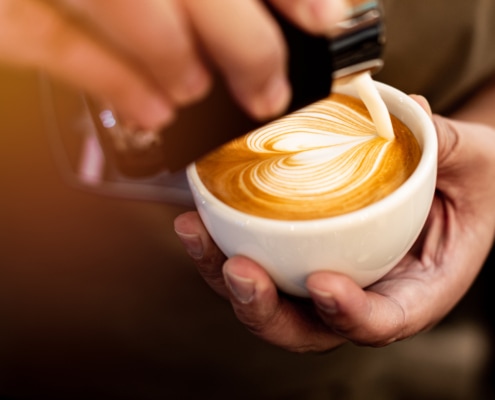 https://www.siamhillscoffee.com/wp-content/uploads/Is-Latte-Art-Good-or-Bad-–-Does-Latte-Art-Make-our-Coffee-Better-or-Worse-–-1.jpg
1412
2122
Siamhillscoffee
https://www.siamhillscoffee.com/wp-content/uploads/coffee-logo.png
Siamhillscoffee2021-04-25 10:57:092021-04-25 11:02:29Is Latte Art Good or Bad? – Does Latte Art Make our Coffee Better or Worse? –
https://www.siamhillscoffee.com/wp-content/uploads/Is-Latte-Art-Good-or-Bad-–-Does-Latte-Art-Make-our-Coffee-Better-or-Worse-–-1.jpg
1412
2122
Siamhillscoffee
https://www.siamhillscoffee.com/wp-content/uploads/coffee-logo.png
Siamhillscoffee2021-04-25 10:57:092021-04-25 11:02:29Is Latte Art Good or Bad? – Does Latte Art Make our Coffee Better or Worse? –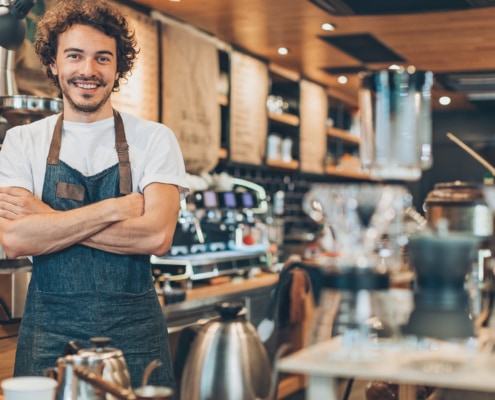 https://www.siamhillscoffee.com/wp-content/uploads/How-To-Open-A-Coffee-Shop-The-Coffee-Shop-Equipment-List-You-Need-1.jpg
1414
2121
Siamhillscoffee
https://www.siamhillscoffee.com/wp-content/uploads/coffee-logo.png
Siamhillscoffee2021-03-21 04:08:192021-03-21 04:08:19How To Open A Coffee Shop – The Coffee Shop Equipment List You Need
https://www.siamhillscoffee.com/wp-content/uploads/How-To-Open-A-Coffee-Shop-The-Coffee-Shop-Equipment-List-You-Need-1.jpg
1414
2121
Siamhillscoffee
https://www.siamhillscoffee.com/wp-content/uploads/coffee-logo.png
Siamhillscoffee2021-03-21 04:08:192021-03-21 04:08:19How To Open A Coffee Shop – The Coffee Shop Equipment List You Need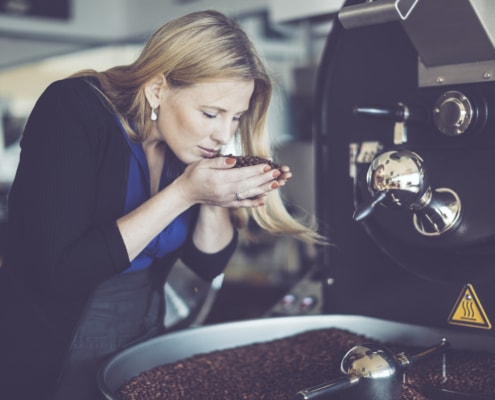 https://www.siamhillscoffee.com/wp-content/uploads/What-is-Coffee-Roasting-–-Everything-You-Need-to-Know-–-1.jpg
1414
2121
Siamhillscoffee
https://www.siamhillscoffee.com/wp-content/uploads/coffee-logo.png
Siamhillscoffee2021-02-20 05:19:592021-03-03 10:49:15What is Coffee Roasting? – Everything You Need to Know –
https://www.siamhillscoffee.com/wp-content/uploads/What-is-Coffee-Roasting-–-Everything-You-Need-to-Know-–-1.jpg
1414
2121
Siamhillscoffee
https://www.siamhillscoffee.com/wp-content/uploads/coffee-logo.png
Siamhillscoffee2021-02-20 05:19:592021-03-03 10:49:15What is Coffee Roasting? – Everything You Need to Know –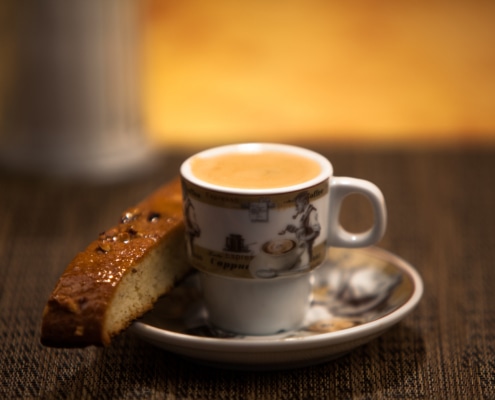 https://www.siamhillscoffee.com/wp-content/uploads/What-is-a-Cafe-Cubano-–-A-Complete-Guide-–-1.jpg
1414
2121
Siamhillscoffee
https://www.siamhillscoffee.com/wp-content/uploads/coffee-logo.png
Siamhillscoffee2021-02-20 04:57:432021-03-03 10:54:47What is a Cafe Cubano – A Complete Guide –
https://www.siamhillscoffee.com/wp-content/uploads/What-is-a-Cafe-Cubano-–-A-Complete-Guide-–-1.jpg
1414
2121
Siamhillscoffee
https://www.siamhillscoffee.com/wp-content/uploads/coffee-logo.png
Siamhillscoffee2021-02-20 04:57:432021-03-03 10:54:47What is a Cafe Cubano – A Complete Guide – https://www.siamhillscoffee.com/wp-content/uploads/Make-Your-Coffee-Healthy-–-Best-10-Ways-For-A-Better-Coffee-Experience-–-1.jpg
1414
2121
Siamhillscoffee
https://www.siamhillscoffee.com/wp-content/uploads/coffee-logo.png
Siamhillscoffee2021-02-12 08:13:182021-03-03 10:57:16Make Your Coffee Healthy – Best 10 Ways For A Better Coffee Experience –
https://www.siamhillscoffee.com/wp-content/uploads/Make-Your-Coffee-Healthy-–-Best-10-Ways-For-A-Better-Coffee-Experience-–-1.jpg
1414
2121
Siamhillscoffee
https://www.siamhillscoffee.com/wp-content/uploads/coffee-logo.png
Siamhillscoffee2021-02-12 08:13:182021-03-03 10:57:16Make Your Coffee Healthy – Best 10 Ways For A Better Coffee Experience – https://www.siamhillscoffee.com/wp-content/uploads/10-Best-Ways-to-Eat-Less-Sugar-–-How-to-Cut-Down-on-Sugar-–-1-scaled.jpg
1709
2560
Siamhillscoffee
https://www.siamhillscoffee.com/wp-content/uploads/coffee-logo.png
Siamhillscoffee2021-02-12 08:07:142021-03-03 10:58:4810 Best Ways to Eat Less Sugar – How to Cut Down on Sugar –
https://www.siamhillscoffee.com/wp-content/uploads/10-Best-Ways-to-Eat-Less-Sugar-–-How-to-Cut-Down-on-Sugar-–-1-scaled.jpg
1709
2560
Siamhillscoffee
https://www.siamhillscoffee.com/wp-content/uploads/coffee-logo.png
Siamhillscoffee2021-02-12 08:07:142021-03-03 10:58:4810 Best Ways to Eat Less Sugar – How to Cut Down on Sugar –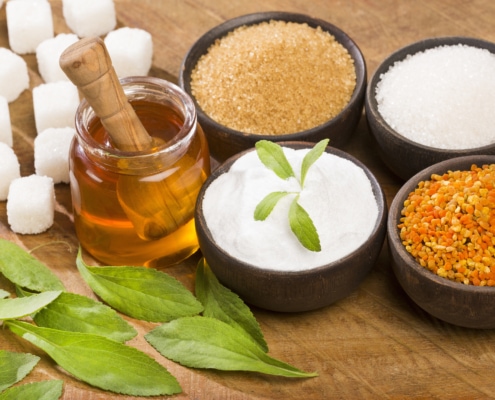 https://www.siamhillscoffee.com/wp-content/uploads/10-Best-Natural-Sugar-Substitutes-–-Your-Healthier-Sugar-Alternatives-to-Try-–-1-scaled.jpg
1707
2560
Siamhillscoffee
https://www.siamhillscoffee.com/wp-content/uploads/coffee-logo.png
Siamhillscoffee2021-02-12 07:32:372021-03-03 11:08:1810 Best Natural Sugar Substitutes – Your Healthier Sugar Alternatives to Try –
https://www.siamhillscoffee.com/wp-content/uploads/10-Best-Natural-Sugar-Substitutes-–-Your-Healthier-Sugar-Alternatives-to-Try-–-1-scaled.jpg
1707
2560
Siamhillscoffee
https://www.siamhillscoffee.com/wp-content/uploads/coffee-logo.png
Siamhillscoffee2021-02-12 07:32:372021-03-03 11:08:1810 Best Natural Sugar Substitutes – Your Healthier Sugar Alternatives to Try – https://www.siamhillscoffee.com/wp-content/uploads/20-Best-Ground-Coffee-Recipes-9.jpg
896
640
Siamhillscoffee
https://www.siamhillscoffee.com/wp-content/uploads/coffee-logo.png
Siamhillscoffee2021-02-12 07:10:502021-03-03 11:14:2220 Best Ground Coffee Recipes – Make Delicious Food With Coffee –
https://www.siamhillscoffee.com/wp-content/uploads/20-Best-Ground-Coffee-Recipes-9.jpg
896
640
Siamhillscoffee
https://www.siamhillscoffee.com/wp-content/uploads/coffee-logo.png
Siamhillscoffee2021-02-12 07:10:502021-03-03 11:14:2220 Best Ground Coffee Recipes – Make Delicious Food With Coffee – https://www.siamhillscoffee.com/wp-content/uploads/Coffee-Roast-Levels-1-scaled.jpg
1707
2560
Siamhillscoffee
https://www.siamhillscoffee.com/wp-content/uploads/coffee-logo.png
Siamhillscoffee2021-02-12 06:58:112021-03-03 11:44:54Coffee Roast Levels – The Differences Between Light, Medium and Dark Roasts –
https://www.siamhillscoffee.com/wp-content/uploads/Coffee-Roast-Levels-1-scaled.jpg
1707
2560
Siamhillscoffee
https://www.siamhillscoffee.com/wp-content/uploads/coffee-logo.png
Siamhillscoffee2021-02-12 06:58:112021-03-03 11:44:54Coffee Roast Levels – The Differences Between Light, Medium and Dark Roasts –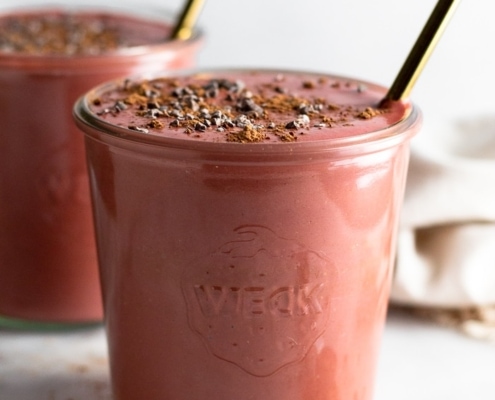 https://www.siamhillscoffee.com/wp-content/uploads/15-Great-Coffee-Breakfast-Smoothies-–-Simply-Delicious-Ways-to-Boost-Your-Morning-–14.jpg
1050
700
Siamhillscoffee
https://www.siamhillscoffee.com/wp-content/uploads/coffee-logo.png
Siamhillscoffee2021-02-12 06:52:492021-03-03 11:46:4615 Great Coffee Breakfast Smoothies – Delicious Ways to Boost Your Morning –
https://www.siamhillscoffee.com/wp-content/uploads/15-Great-Coffee-Breakfast-Smoothies-–-Simply-Delicious-Ways-to-Boost-Your-Morning-–14.jpg
1050
700
Siamhillscoffee
https://www.siamhillscoffee.com/wp-content/uploads/coffee-logo.png
Siamhillscoffee2021-02-12 06:52:492021-03-03 11:46:4615 Great Coffee Breakfast Smoothies – Delicious Ways to Boost Your Morning –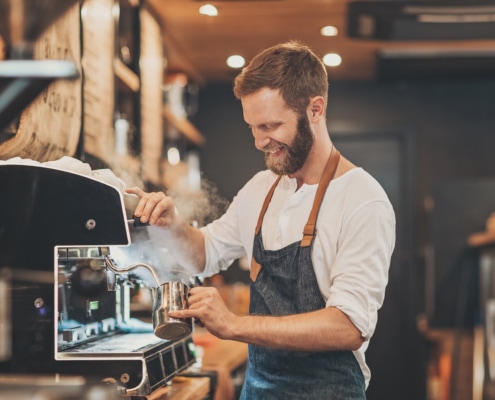 https://www.siamhillscoffee.com/wp-content/uploads/What-is-a-Barista-–-How-to-Professionally-Make-Coffee-–-1-scaled.jpg
1707
2560
Siamhillscoffee
https://www.siamhillscoffee.com/wp-content/uploads/coffee-logo.png
Siamhillscoffee2021-02-12 05:15:182021-03-03 12:02:08What is a Barista? – How to Professionally Make Coffee –
https://www.siamhillscoffee.com/wp-content/uploads/What-is-a-Barista-–-How-to-Professionally-Make-Coffee-–-1-scaled.jpg
1707
2560
Siamhillscoffee
https://www.siamhillscoffee.com/wp-content/uploads/coffee-logo.png
Siamhillscoffee2021-02-12 05:15:182021-03-03 12:02:08What is a Barista? – How to Professionally Make Coffee – https://www.siamhillscoffee.com/wp-content/uploads/How-To-Open-A-Coffee-Shop-The-10-Most-Important-Steps-1-scaled.jpg
1708
2560
Siamhillscoffee
https://www.siamhillscoffee.com/wp-content/uploads/coffee-logo.png
Siamhillscoffee2021-02-12 04:37:232021-03-03 12:10:33How To Open A Coffee Shop – The 10 Most Important Steps
https://www.siamhillscoffee.com/wp-content/uploads/How-To-Open-A-Coffee-Shop-The-10-Most-Important-Steps-1-scaled.jpg
1708
2560
Siamhillscoffee
https://www.siamhillscoffee.com/wp-content/uploads/coffee-logo.png
Siamhillscoffee2021-02-12 04:37:232021-03-03 12:10:33How To Open A Coffee Shop – The 10 Most Important Steps https://www.siamhillscoffee.com/wp-content/uploads/How-To-Sell-Coffee-Online-–-Open-Your-Own-Online-Coffee-Shop-1-scaled.jpg
1697
2560
Siamhillscoffee
https://www.siamhillscoffee.com/wp-content/uploads/coffee-logo.png
Siamhillscoffee2021-02-12 04:32:292021-03-03 12:12:06How To Sell Coffee Online – Open Your Own Online Coffee Shop
https://www.siamhillscoffee.com/wp-content/uploads/How-To-Sell-Coffee-Online-–-Open-Your-Own-Online-Coffee-Shop-1-scaled.jpg
1697
2560
Siamhillscoffee
https://www.siamhillscoffee.com/wp-content/uploads/coffee-logo.png
Siamhillscoffee2021-02-12 04:32:292021-03-03 12:12:06How To Sell Coffee Online – Open Your Own Online Coffee Shop https://www.siamhillscoffee.com/wp-content/uploads/Make-Your-Coffee-Better-–-6-Fun-Ways-to-Boost-Your-Coffee-–-1-scaled.jpg
1709
2560
Siamhillscoffee
https://www.siamhillscoffee.com/wp-content/uploads/coffee-logo.png
Siamhillscoffee2021-02-12 03:45:112021-03-03 12:29:07Make Your Coffee Better – 6 Fun Ways to Boost Your Coffee –
https://www.siamhillscoffee.com/wp-content/uploads/Make-Your-Coffee-Better-–-6-Fun-Ways-to-Boost-Your-Coffee-–-1-scaled.jpg
1709
2560
Siamhillscoffee
https://www.siamhillscoffee.com/wp-content/uploads/coffee-logo.png
Siamhillscoffee2021-02-12 03:45:112021-03-03 12:29:07Make Your Coffee Better – 6 Fun Ways to Boost Your Coffee – https://www.siamhillscoffee.com/wp-content/uploads/A-Coffee-Journey-–-10-Steps-From-the-Seed-to-Your-Cup-–-1-scaled.jpg
1700
2560
Siamhillscoffee
https://www.siamhillscoffee.com/wp-content/uploads/coffee-logo.png
Siamhillscoffee2021-02-12 02:31:102021-02-20 14:09:30A Coffee Journey – 10 Steps From the Seed to Your Cup –
https://www.siamhillscoffee.com/wp-content/uploads/A-Coffee-Journey-–-10-Steps-From-the-Seed-to-Your-Cup-–-1-scaled.jpg
1700
2560
Siamhillscoffee
https://www.siamhillscoffee.com/wp-content/uploads/coffee-logo.png
Siamhillscoffee2021-02-12 02:31:102021-02-20 14:09:30A Coffee Journey – 10 Steps From the Seed to Your Cup – https://www.siamhillscoffee.com/wp-content/uploads/Cold_Brew_Coffee_An_Honest_Opinion_All_You_Need_To_Know_1.jpg
3144
4608
Siamhillscoffee
https://www.siamhillscoffee.com/wp-content/uploads/coffee-logo.png
Siamhillscoffee2019-11-06 05:01:152021-03-03 13:30:17Cold Brew Coffee – An Honest Opinion – All You Need to Know
https://www.siamhillscoffee.com/wp-content/uploads/Cold_Brew_Coffee_An_Honest_Opinion_All_You_Need_To_Know_1.jpg
3144
4608
Siamhillscoffee
https://www.siamhillscoffee.com/wp-content/uploads/coffee-logo.png
Siamhillscoffee2019-11-06 05:01:152021-03-03 13:30:17Cold Brew Coffee – An Honest Opinion – All You Need to Know
